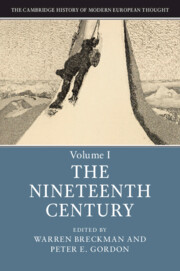Book contents
- The Cambridge History of Modern European Thought
- The Cambridge History of Modern European Thought
- The Cambridge History of Modern European Thought
- Copyright page
- Contents
- Contributors
- Preface
- Introduction
- 1 German Idealism: The Thought of Modernity
- 2 European Romanticism: Ambivalent Responses to the Sense of a New Epoch
- 3 History, Tradition, and Skepticism: The Patterns of Nineteenth-Century Theology
- 4 The Young Hegelians: Philosophy as Critical Praxis
- 5 Utilitarianism, God, and Moral Obligation from Locke to Sidgwick
- 6 Capital, Class, and Empire: Nineteenth-Century Political Economy and Its Imaginary
- 7 Positivism in European Intellectual, Political, and Religious Life
- 8 European Liberalism in the Nineteenth Century
- 9 European Socialism from the 1790s to the 1890s
- 10 Conservatism: The Utility of History and the Case against Rationalist Radicalism
- 11 The Woman Question: Liberal and Socialist Critiques of the Status of Women
- 12 Darwinism and Social Darwinism
- 13 Historicism from Ranke to Nietzsche
- 14 Philology, Language, and the Constitution of Meaning and Human Communities
- 15 Decadence and the “Second Modernity”
- 16 Nihilism, Pessimism, and the Conditions of Modernity
- 17 Civilization, Culture, and Race: Anthropology in the Nineteenth Century
- 18 The Varieties of Nationalist Thought
- 19 Ideas of Empire: Civilization, Race, and Global Hierarchy
- 20 Rethinking Revolution: Radicalism at the End of the Long Nineteenth Century
- Index
9 - European Socialism from the 1790s to the 1890s
Published online by Cambridge University Press: 15 August 2019
- The Cambridge History of Modern European Thought
- The Cambridge History of Modern European Thought
- The Cambridge History of Modern European Thought
- Copyright page
- Contents
- Contributors
- Preface
- Introduction
- 1 German Idealism: The Thought of Modernity
- 2 European Romanticism: Ambivalent Responses to the Sense of a New Epoch
- 3 History, Tradition, and Skepticism: The Patterns of Nineteenth-Century Theology
- 4 The Young Hegelians: Philosophy as Critical Praxis
- 5 Utilitarianism, God, and Moral Obligation from Locke to Sidgwick
- 6 Capital, Class, and Empire: Nineteenth-Century Political Economy and Its Imaginary
- 7 Positivism in European Intellectual, Political, and Religious Life
- 8 European Liberalism in the Nineteenth Century
- 9 European Socialism from the 1790s to the 1890s
- 10 Conservatism: The Utility of History and the Case against Rationalist Radicalism
- 11 The Woman Question: Liberal and Socialist Critiques of the Status of Women
- 12 Darwinism and Social Darwinism
- 13 Historicism from Ranke to Nietzsche
- 14 Philology, Language, and the Constitution of Meaning and Human Communities
- 15 Decadence and the “Second Modernity”
- 16 Nihilism, Pessimism, and the Conditions of Modernity
- 17 Civilization, Culture, and Race: Anthropology in the Nineteenth Century
- 18 The Varieties of Nationalist Thought
- 19 Ideas of Empire: Civilization, Race, and Global Hierarchy
- 20 Rethinking Revolution: Radicalism at the End of the Long Nineteenth Century
- Index
Summary
What came to be called ‘socialism’ was a product of the turbulent years of the French Revolution and the Napoleonic wars. The word entered political language in the 1830s and was universally associated with the work of three founding ‘prophets’: Henri de Saint-Simon and Charles Fourier in France, and Robert Owen in Britain. Adolphe Blanqui, originally in 1837, described Fourier and Owen as “utopian economists,” while Lorenz von Stein in 1842 defined socialism as that “theory which made work the sole basis of society and the state.”
- Type
- Chapter
- Information
- The Cambridge History of Modern European Thought , pp. 196 - 231Publisher: Cambridge University PressPrint publication year: 2019
- 12
- Cited by

